
Wright State opens the College of Health, Education, and Human Services in response to workforce and education needs. (Illustration credit: Cody Rayn of the Ohlmann Group)
Wright State University has brought together its health-related and education programs to form a new college to create experiential opportunities for students and joint research opportunities for students and faculty.
After years of planning, Wright State restructured existing undergraduate and graduate programs into the College of Health, Education, and Human Services, which was launched this fall. It’s the first new college opened at Wright State in over three decades.
The college has been reorganized to include:
- School of Nursing, Kinesiology, and Health Sciences
- School of Social Work and Human Services
- School of Education and Leadership
- School of Professional Psychology
The college was strategically designed to better respond to the region’s workforce and educational needs, said President Susan Edwards, Ph.D.
“The College of Health, Education, and Human Services brings together the outstanding faculty, staff, and students from Wright State’s health-related and education programs to offer more educational paths to in-demand careers as well as providing increased interprofessional experiential learning and research opportunities,” Edwards said.
The college was structured to recognize that, in today’s world, providing for people’s health and well-being is not limited to medical care. It is conducted by teams that include, but are not limited to, nursing, mental health, education, social work, and counseling.
“I look forward to seeing the development of additional programs critical to meeting the needs of the region through this new collaborative college,” Edwards said.
Leading in a changing world
“The new college is an opportunity for the university to grow and remain a leader in our continuously changing world,” said Elizabeth Talbot, Ph.D., associate professor and chair of social work.
All of the areas of study in the college focus on human development, are professional programs, and prepare leaders in their respective fields, said Carol Patitu, Ph.D., chair of leadership studies in education and organizations and teacher education.
“Wright State’s College of Health, Education, and Human Services is dedicated to preparing educators, health professionals, and organizational leaders—the very people who provide fundamental services to our communities,” she said. “Having all of these programs together enhances our synergy and aligns our similar missions to ensure our community professionals are prepared to effectively work, lead, and innovate.”
Oliver H. Evans, Ph.D., who joined Wright State as interim provost in February 2021, said the programs in the college focus on preparing students to address significant issues affecting all parts of the United States, especially Raider Country. The college offers programs that address issues of physical, mental, and emotional health; family, human services, education, and even law enforcement, he said.
“It attempts to take a holistic view of those issues and to address them not as individual symptoms but as multifaceted symptoms that require a range of services and a range of knowledge in order to treat them effectively,” he said.
A collaborative relationship between programs can help them evolve to meet the demands of a changing world. “Programs undergo changes as society’s expectations of them change and as the expectations of what it means to be a professional in the program change as well,” Evans said. “Every one of the programs is undergoing changes in terms of what they do themselves but also in terms of their relationship with one another.”
For instance, the School of Nursing plans to implement a pioneering collaborative leadership model to offset national nursing leader and succession scarcities. It will be led by a forward-looking triumvirate—Ann Stalter, Ph.D., professor and chair of nursing; Sherry Farra, Ph.D., assistant chair of nursing; and Deborah Ulrich, Ph.D., former interim dean who has returned to the faculty.
They plan to work together, using their wisdom and experiences to make a difference for all stakeholders—patients, students, faculty, agencies, universities, communities, and, as needed, globally.
“Our emphasis is excellence in education, practice, and scholarship with the goal of providing high quality, safe, compassionate, and equitable care,” Stalter said.
Stressing collaboration
An emphasis in the College of Health, Education, and Human Services is interprofessional collaboration among the students, faculty, and staff. Faculty and students across the different programs are expected to pursue research, learning, and other collaborative activities.
Evans said a key to the college’s success is creating a community of programs through interprofessional collaboration. “The success of the mission relies on the programs not being just a collection of programs as they currently exist, but a gathering of programs really that have rethought themselves and their relationships with others,” he said.
Allowing nursing students to learn among other health care professionals will give them broader insights or care provision with cross-training possibilities, Ulrich said. “The wealth of experience among the disciplines will improve educational opportunities for all students within the new college,” Farra said.
Talbot noted that social workers usually come from diverse and interprofessional knowledge bases. For instance, many social workers enter Wright State’s Master of Arts Social Work program after earning undergraduate degrees from other fields, including health, education, and human services.
“The social work program brings opportunities for collaborative practice, research, and a shared knowledge base that intersects with the other programs,” Talbot said. “The collaboration between social work and the other departments provide opportunities to expand the knowledge base, and enhance the skills of students from all of the programs in the new college.”
Similarly, graduates of the School of Professional Psychology work in numerous fields including government, the military, higher education, medical, private practice, research, business, forensic, and child-focused settings.
“As we train future clinical psychologists, we are investing in the health and well-being of our global community,” said LaTrelle Jackson, Ph.D., professor and interim dean of the School of Professional Psychology. “The fact that the college encompasses the medical, education, counseling, and psychological sectors of training ensures the opportunity for Wright State students to benefit from an interdisciplinary perspective.”
Patitu said opportunities exist for more collaboration among the doctoral program in organizational studies, the nursing program, and the School of Professional Psychology, including sharing courses. She predicts the college will create more interest in the Program Evaluation Certificate and other certificate programs.
“Our leadership studies faculty have collaborated for years with the other colleges and departments and look forward to being together in the new College of Health, Education, and Human Services,” Patitu said.
Wright State’s nursing program fits well into the new health college because nurses represent the largest number of health care providers and are key to patient care across the health care continuum, Stalter said.
“Nurses often lead and are part of interprofessional teams coordinating care across the lifespan within communities and across academic and health systems,” she said.
The college will also emphasize providing experiential learning opportunities for students that will assist them by putting their classroom theory into practice and prepare them with skills and knowledge critical to regional employers.
During the pandemic, nurses demonstrated skills caring for COVID-19 patients and leading vaccination programs aimed at providing safe, equitable care and quality health protection. “This has been evident among Wright State nurses, responding with disaster planning using crisis standards of care within our local communities,” Stalter said.
Interprofessional collaboration can lead to increased opportunities for students through internships, new research, participation in interdisciplinary presentations and conferences, and expanding job opportunities.
Interprofessional experiences offer opportunities to engage in collaborative discussions that build knowledge and understanding, Talbot said. They can also expose students to diverse perspectives and practices in research, and begin to understand how to work with differences in opinion.
“It expands the diversity of lenses through which students observe and ponder the problems professionals face in the world of practice,” Talbot said. “They have opportunities to debate issues in the safety of an educational environment, and through the diversity of lenses in the multiple professions available in the new college.”
Collaborating with other disciplines will also help advance research opportunities among faculty. “Organizing within an overarching health college provides faculty with research teams to enhance clinical practice and design innovative programs to improve patient and student learning outcomes,” Stalter said.
Putting students first
Faculty, staff, and administrators have been encouraged to identify novel approaches to operate efficiently and effectively. Reorganizing related programs into a new college will enhance student success, including integrated retention strategies, and make it easier for students who want to change majors to related programs. It can also simplify the process for students to access advising services.
Patitu said reorganizing the health and other helping professions in the new college will put students first, enhancing recruitment, retention, and completion.
“Enrollments will be enhanced, financial sustainability will be created, and recruitment and marketing efforts will be more efficient when directed to students with similar interests in health and other helping professions,” she said.
Work on creating the new college started in 2017. The process has involved hundreds of people from the Wright State community, including the Academic Organization Review Steering Committee and regional stakeholders. Working groups were responsible for numerous areas including accreditation, affiliation agreements, community advocacy/relations, curriculum, data governance, governance, steering, student success and services, wellness culture/relationship building, and workforce development, community engagement, and partnerships.
Jackson said it is inspiring to know that years of planning have paid off.
“It is exciting to see Wright State University grow in this unique way to equip our future workforce while meeting the demands of our business, government, clinical, and educational sectors,” she said.
For more information on the College of Health, Education, and Human Services, visit wright.edu/cheh.
This article was originally published in the fall 2021 issue of the Wright State Magazine. Find more stories at wright.edu/alumnimag.

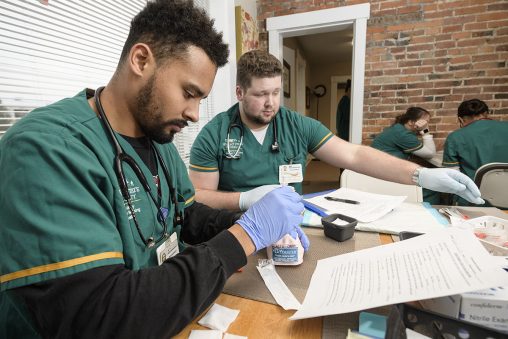
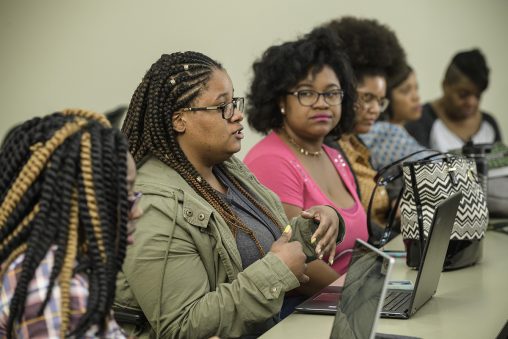
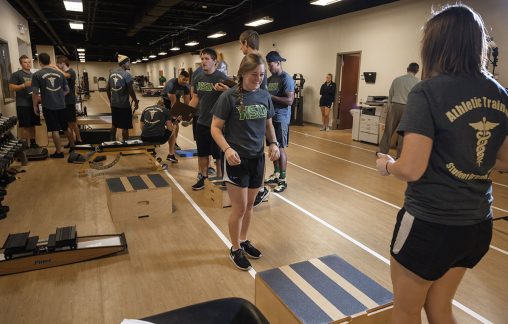
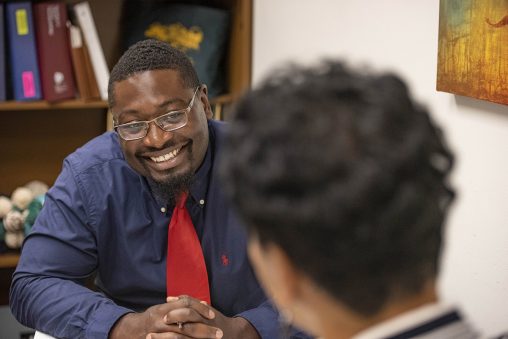
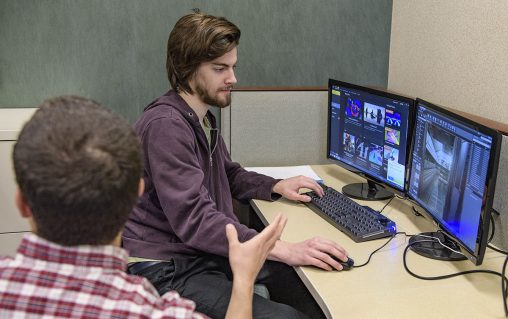
 Wright State alum Lindsay Aitchison fulfills childhood space-agency dream
Wright State alum Lindsay Aitchison fulfills childhood space-agency dream  Wright State business professor, alumnus honored by regional technology organizations
Wright State business professor, alumnus honored by regional technology organizations  Wright State University Foundation awards 11 Students First Fund projects
Wright State University Foundation awards 11 Students First Fund projects  Gov. DeWine reappoints Board Treasurer Beth Ferris and names student Ella Vaught to Wright State Board of Trustees
Gov. DeWine reappoints Board Treasurer Beth Ferris and names student Ella Vaught to Wright State Board of Trustees  Joe Gruenberg’s 40-Year support for Wright State celebrated with Honorary Alumnus Award
Joe Gruenberg’s 40-Year support for Wright State celebrated with Honorary Alumnus Award 